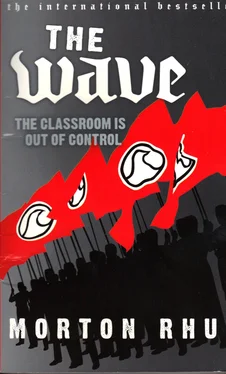Мортон Рю - The Wave
Здесь есть возможность читать онлайн «Мортон Рю - The Wave» весь текст электронной книги совершенно бесплатно (целиком полную версию без сокращений). В некоторых случаях можно слушать аудио, скачать через торрент в формате fb2 и присутствует краткое содержание. Жанр: Современная проза, на английском языке. Описание произведения, (предисловие) а так же отзывы посетителей доступны на портале библиотеки ЛибКат.
- Название:The Wave
- Автор:
- Жанр:
- Год:неизвестен
- ISBN:нет данных
- Рейтинг книги:5 / 5. Голосов: 1
-
Избранное:Добавить в избранное
- Отзывы:
-
Ваша оценка:
- 100
- 1
- 2
- 3
- 4
- 5
The Wave: краткое содержание, описание и аннотация
Предлагаем к чтению аннотацию, описание, краткое содержание или предисловие (зависит от того, что написал сам автор книги «The Wave»). Если вы не нашли необходимую информацию о книге — напишите в комментариях, мы постараемся отыскать её.
It had begun as a simple history experiment to liven up their World War II studies, but, before long, Laurie Saunders sees her classmates change into chanting, saluting fanatics, caught up in a new organization called The Wave.
Laurie is afraid, but realizes that she must do something to stop it before it's too late...
A compelling novel based on a true incident that occurred in a high school history class in California.
The Wave — читать онлайн бесплатно полную книгу (весь текст) целиком
Ниже представлен текст книги, разбитый по страницам. Система сохранения места последней прочитанной страницы, позволяет с удобством читать онлайн бесплатно книгу «The Wave», без необходимости каждый раз заново искать на чём Вы остановились. Поставьте закладку, и сможете в любой момент перейти на страницу, на которой закончили чтение.
Интервал:
Закладка:
Morton Rhue
The Wave
1
Laurie Saunders sat in the publications office at Gordon High School chewing on the end of a Bic pen. She was a pretty girl with short light-brown hair and an almost perpetual smile that only disappeared when she was upset or chewing on Bic pens. Lately she'd been chewing on a lot of pens. In fact, there wasn't a single pen or pencil in her pocket-book that wasn't worn down on the butt end from nervous gnawing. Still, it beat smoking.
Laurie looked around the small office, a room filled with desks, typewriters, and light tables. At that moment there should have been kids at each one of those type-writers, punching out stories for The Gordon Grapevine, the school paper. The art and layout staff should have been working at the light tables, laying out the next issue. But instead the room was empty except for Laurie. The problem was that it was a beautiful day outside.
Laurie felt the plastic tube of the pen crack. Her mother had warned her once that someday she would chew on a pen until it splintered and a long plastic shard would lodge in her throat and she would choke to death on it. Only her mother could have come up with that, Laurie thought with a sigh.
She looked up at the clock on the wall. Only a few minutes were left in the period anyway. There was no rule that said anyone had to work in the publications office during their free periods, but they all knew that the next edition of The Grapevine was due out next week. Couldn't they give up their Frisbees and cigarettes and suntans for just a few days in order to get an issue of the paper out on time?
Laurie put her pen back in her pocket-book and started to gather up her notebooks for the next period. It was hopeless. For the three years she'd been on the staff, The Grapevine had always been late. And now that she was the editor-in-chief it made no difference. The paper would be done when everyone got around to doing it.
Pulling the door of the publications office closed behind her, Laurie stepped out into the hall. It was practically empty now; the bell to change classes had not yet rung, and there were only a few students around. Laurie walked down a few doors, stopped outside a classroom, and peered through the window.
Inside, her best friend, Amy Smith, a petite girl with thick, curly, Goldilocks hair, was trying to endure the final moments of Mr Gabondi's French class. Laurie had taken French with Mr Gabondi the year before and it had been one of the most excruciatingly boring experiences of her life. Mr Gabondi was a short, dark, heavy-set man who always seemed to be sweating, even on the coldest winter days. When he taught, he spoke in a dull monotone that could easily put the brightest student to sleep, and even though the course he taught was not difficult, Laurie recalled how hard it had been to pay enough attention to get an A.
Now watching her friend struggle to stay interested, Laurie decided she needed some cheering up. So, positioning herself outside the door where Amy could see her but Gabondi could not, Laurie crossed her eyes and made an idiotic face. Amy reacted by putting her hand over her mouth to keep from laughing. Laurie made another face and Amy tried not to look, but she couldn't help turning back to see what her friend was doing next. Then Laurie did her famous fish face: she pushed her ears out, crossed her eyes, and puckered her lips. Amy was trying so hard not to laugh that tears started to roll down her cheeks.
Laurie knew she shouldn't make any more faces. Watching Amy was too funny — anything could make her laugh. If Laurie did any more, Amy would probably fall out of her seat and roll into the aisle between the desks. But Laurie couldn't resist. Turning her back to the door to create some suspense, she screwed up her mouth and eyes, and then spun around.
Standing at the door was a very angry Mr Gabondi. Behind him Amy and the rest of her class were in hysterics.
Laurie's jaw dropped. But before Gabondi could reprimand her, the bell rang and his class was suddenly spilling out into the hall around him. Amy came out holding her sides in pain from laughing so hard. As Mr Gabondi glared at them, the two girls went off arm in arm towards their next class, too out of breath to laugh any more.
In the classroom where he taught history, Ben Ross crouched over a film projector, trying to thread a film through the complex maze of rollers and lenses. This was his fourth attempt and he still hadn't got it right. Frustrated, Ben ran his fingers through his wavy brown hair. All his life he had been befuddled by machinery — film projectors, cars, even the self-service pump at the local garage drove him bananas.
He had never been able to figure out why he was so inept in that way, and so when it came to anything mechanical, he left it to Christy, his wife. She taught music and choir at Gordon High, and at home she was in charge of anything that required manual dexterity. She often joked that Ben couldn't even be trusted to change a light bulb correctly, although Ben insisted this was an exaggeration. He had changed a number of light bulbs in his life and could only recall breaking two in the process.
Thus far in his career at Gordon High — Ben and Christy had been teaching there for two years — he had managed to hide his mechanical inabilities. Or rather, they had been overshadowed by his growing reputation as an outstanding young teacher. Ben's students spoke of his intensity — the way he got so interested and involved in a topic that they couldn't help but be interested also. He was “contagious”, they'd say, meaning that he was charismatic. He could get through to them.
Ross's fellow faculty members were somewhat more divided in their feelings towards him. Some of them were impressed with his energy and dedication and creativity. It was said that he brought a new outlook to his classes, that, whenever possible, he tried to teach his students the practical, relevant aspects of history. If they were studying the political system, he would divide the class into political parties. If they studied a famous trial, he might assign one student to be the defendant, others to be the prosecution and defence lawyers, and still other to sit as the jury.
But other faculty members were more sceptical about Ben. Some said he was just young, naive, and over-zealous, that after a few years he would calm down and start conducting classes the “right” way — lots of reading, weekly quizzes, classroom lectures. Others simply said they didn't like the way he never wore a suit and tie in class. One or two might even admit they were just plain jealous.
But if there was one thing no teacher had to be jealous of, it was Ben's total inability to cope with film projectors. While perhaps brilliant otherwise, now he only scratched his head and looked at the tangle of celluloid bunched in the machine. In just a few minutes his senior history class would arrive, and he had been looking forward to showing them this film for weeks. Why hadn't his teacher's college given a course in film threading?
Ross rolled the film back into its spool and left it unthreaded. No doubt one of the kids in his class was some kind of audiovisual whiz and could get the machine going in an instant. He walked back to his desk and picked up a pile of homework papers he wanted to distribute to the students before they saw the film.
The marks on the papers had become predictable, Ben thought as he thumbed through them. As usual, there were two A papers, Laurie Saunders's and Amy Smith's.
There was one A—, then the normal bunch of B's and C's. There were two D's. One was Brian Ammon, a quarterback on the football team, who seemed to enjoy getting low marks, even though it was obvious to Ben that he had the brains to do much better if he tried. The other D was Robert Billings, the class loser. Ross shook his head. The Billings boy was a real problem.
Читать дальшеИнтервал:
Закладка:
Похожие книги на «The Wave»
Представляем Вашему вниманию похожие книги на «The Wave» списком для выбора. Мы отобрали схожую по названию и смыслу литературу в надежде предоставить читателям больше вариантов отыскать новые, интересные, ещё непрочитанные произведения.
Обсуждение, отзывы о книге «The Wave» и просто собственные мнения читателей. Оставьте ваши комментарии, напишите, что Вы думаете о произведении, его смысле или главных героях. Укажите что конкретно понравилось, а что нет, и почему Вы так считаете.












